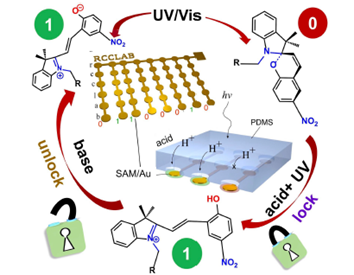CBE & MSE Seminar: Translating Molecular Switching Phenomena to Device Contexts Using Unconventional Fabrication

University of Groningen, Netherlands
Abstract: Unlike bulk transport, in molecular electronics, molecules span both electrodes, and the dominant mechanism of transport is non-resonant tunneling. As a result, very small structural changes to the molecules can alter conductivity by orders of magnitude, and it can be bias-dependant, allowing the tuning of rectification ratios. However, coupling these changes to external inputs and translating the phenomenology into stable device platforms is complicated by the fragility, nanoscale dimensions and thermodynamics of molecular switches. Soft lithography and other unconventional fabrication techniques are particularly well suited to address these problems. In this talk I will discuss our recent work on addressing the thermodynamic limits of surface-bound switches. In the figure below, we combine light and chemical inputs to lock and unlock spiropyran-based switches in mixed monolayers, circumventing side reactions and the thermodynamic instability of the merocyanine form of the switch, enabling the writing, erasing and rewriting of binary data on surface-bound switches. I will also discuss molecular devices that can be reversibly switched between resistive and diode behaviors by altering the electrostatics of the molecule-electrode interface. Switching between these two behaviors can be accomplished using chemical or optical inputs.

In the second part of the talk, I will discuss two very different approaches to fabricating photovoltaic devices using green solvents and the self-assembly of photosystem complexes derived from cyanobacteria.
Bio: Ryan C. Chiechi obtained his bachelor's degree in 2001 in biochemistry at the University of Oregon, where he worked under Michael Haley synthesizing subunits of graphdiyne. From 2001-2005, he earned his doctorate in chemistry at UCLA with Fred Wudl as an NSF-IGERT fellow co-supervised by Yang Yang. Chiechi's doctorate focused on the design and synthesis of electroactive and luminescent materials for organic photovoltaics and organic light-emitting devices. In 2006 he moved to Harvard University for a postdoctoral fellowship with George M. Whitesides. At Harvard he pioneered the use of eutectic Ga-In as a tool for constructing bottom-up, large-area molecular junctions. In 2009 he was appointed assistant professor at the University of Groningen in the Stratingh Institute for Chemistry and the Zernike Institute for Advanced Materials. In 2014 Chiechi was promoted to associate professor of organic materials chemistry. His research focuses on the structure-function relationships of molecular materials in the context of electronic devices.
Host: Alon Gorodetsky
Share
Upcoming Events
-
MAE 298 SEMINAR: Co-Designing Mutual Aid Transportation for Disaster Resilience
-
CBE 298 Seminar: Engineering Strategies for Structural Heart Disease
-
MSE 298 Seminar: Radiation Resistance and Mechanical Response of Ceramics in Extreme Environments
-
MAE 298 SEMINAR: Stretchable Electronics for Soft Biological and Robotic Systems
-
CBE Distinguished Lecture/CBE 298 Seminar: Computational Design of Peptides as Detectors, Sensors and Drugs
